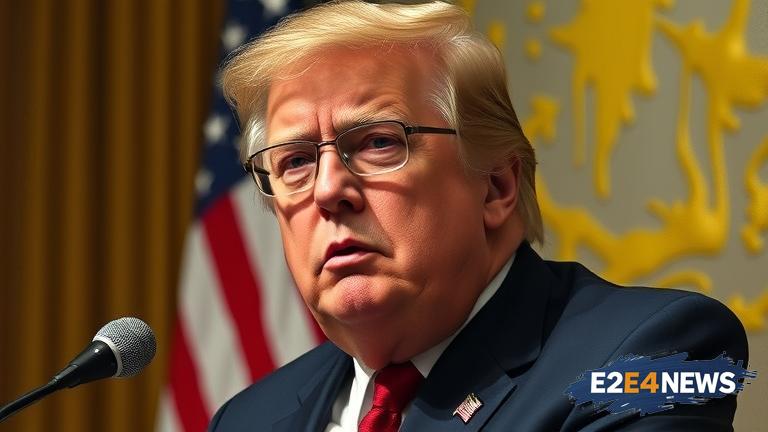The former National Security Adviser, John Bolton, has publicly criticized President Trump’s strategy towards Ukraine, describing it as incoherent and lacking a clear direction. Bolton’s comments come at a time when the United States is navigating a complex geopolitical landscape, with Ukraine being a key player in the region. The country has been embroiled in a conflict with Russian-backed separatists, and the US has been providing military aid to Ukraine. However, President Trump’s approach to the situation has been marred by controversy, including his decision to withhold military aid to Ukraine, which was widely seen as a move to pressure the country into investigating his political rival, Joe Biden. Bolton, who served as National Security Adviser from 2018 to 2019, has been a vocal critic of Trump’s foreign policy, and his comments on Ukraine are just the latest example of his disagreement with the President’s approach. According to Bolton, Trump’s strategy towards Ukraine is incoherent because it lacks a clear objective and is driven by short-term political considerations rather than long-term strategic thinking. Bolton has also criticized Trump’s decision to withhold military aid to Ukraine, saying that it was a mistake that undermined the country’s ability to defend itself against Russian aggression. Furthermore, Bolton has expressed his concern that Trump’s approach to Ukraine is being driven by his personal interests rather than a genuine commitment to supporting the country’s sovereignty and territorial integrity. The former National Security Adviser has also criticized Trump’s handling of the situation in Ukraine, saying that it has been marked by a lack of consistency and coherence. For example, Trump has at times been critical of Ukraine’s government, while at other times he has expressed his support for the country’s efforts to combat Russian aggression. Bolton has also pointed out that Trump’s approach to Ukraine has been influenced by his personal relationships with other world leaders, including Russian President Vladimir Putin. According to Bolton, Trump’s desire to improve relations with Russia has led him to downplay the threat posed by Russian aggression in Ukraine, and to prioritize his personal relationship with Putin over the interests of the United States. The former National Security Adviser has also criticized Trump’s decision to meet with Putin in Helsinki in 2018, saying that it was a mistake that undermined the United States’ credibility and influence in the region. In addition, Bolton has expressed his concern that Trump’s approach to Ukraine is being driven by a lack of understanding of the country’s history and culture. For example, Trump has at times referred to Ukraine as a corrupt country, without acknowledging the significant progress that the country has made in recent years in terms of reform and democratization. Bolton has also pointed out that Trump’s approach to Ukraine has been marked by a lack of engagement with the country’s civil society and opposition groups. According to Bolton, this has undermined the United States’ ability to support Ukraine’s democratic development and to promote stability in the region. The former National Security Adviser has also criticized Trump’s handling of the situation in Ukraine, saying that it has been marked by a lack of transparency and accountability. For example, Trump has at times refused to disclose the details of his conversations with Putin, including their discussion of Ukraine. Bolton has also expressed his concern that Trump’s approach to Ukraine is being driven by a desire to undermine the credibility of the US intelligence community, which has concluded that Russia interfered in the 2016 presidential election. According to Bolton, this has undermined the United States’ ability to respond effectively to Russian aggression in Ukraine, and to promote stability in the region. In conclusion, Bolton’s criticism of Trump’s Ukraine strategy highlights the need for a more coherent and effective approach to the situation in Ukraine. The United States needs to prioritize its support for Ukraine’s sovereignty and territorial integrity, and to promote stability in the region through a combination of diplomatic, economic, and military means. This requires a long-term strategic approach, rather than a short-term focus on political considerations. The US also needs to engage more effectively with Ukraine’s civil society and opposition groups, and to promote transparency and accountability in its dealings with the country. Ultimately, the United States needs to recognize that its approach to Ukraine is not just about supporting a key ally, but also about promoting its own national security interests and upholding its values of democracy and human rights.
